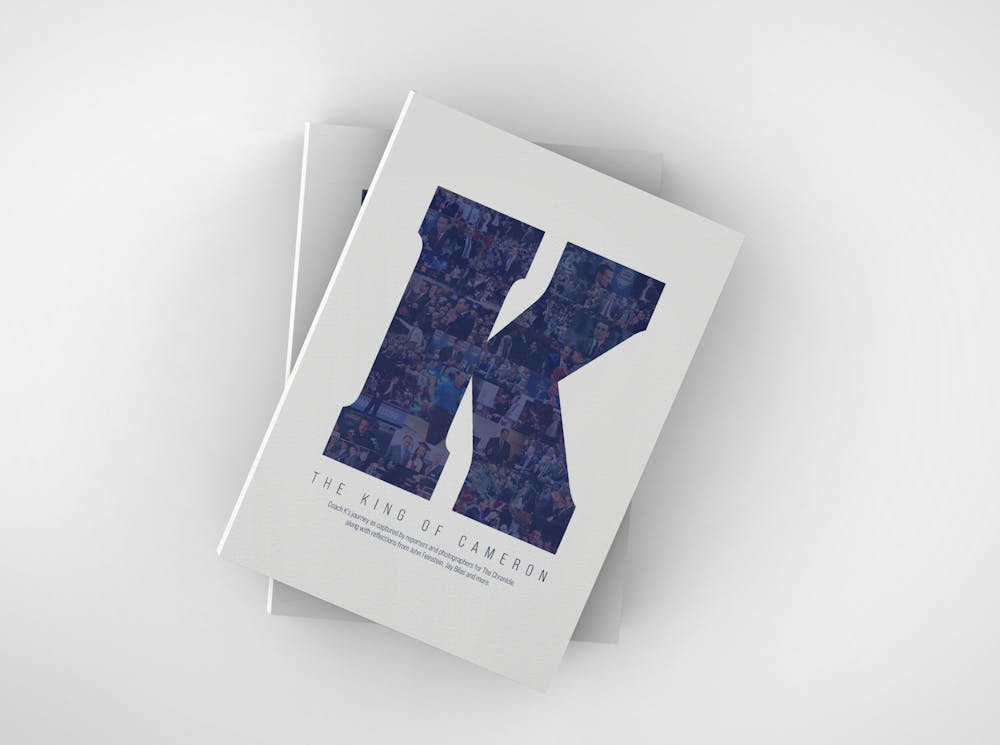It is said that the best measure of one’s character is how he treats someone who can do nothing for him. If that’s true, I should have a precise measure of Coach K’s character because I once spent a full year in a position where I could do virtually nothing for him.
You see, I was a walk-on—the sporting equivalent of a glitch in the space-time continuum. Being a walk-on at Duke (at my skill level) was an unimaginably impossible dream come true and (more practically) a series of self-inflicted humiliations that provided at least a tiny comic contribution to the team, at least to the players. Coach K, to bring us back to my thesis, had the decency to look away.
My specific basketball-playing contribution to the team notwithstanding, what I did have quite literally was a front-row seat to the world that Coach K created. I very rarely left that seat, but what I saw, what I experienced, what I came to feel—if not fully to understand—was a gift beyond value.
First and foremost, it wasn’t about basketball. At that level, skill and talent are ubiquitous (myself, again, notwithstanding). Basketball is the form, but the true contest itself was about the tangled and messy negotiations we all navigate every moment of our lives, primarily with ourselves and then with each other. Coach K taught basketball, every day, in every practice and every game, but what he preached, what he lived, what he demanded and what he asked us all to live up to was something bigger. The best word I have for it is obligation.
I know it’s hardly an inspiring word, but stick with me on this. Above all, Coach K was driving us to live up to our obligation to ourselves—to take every advantage of every possibility we had. To refuse, absolutely and relentlessly, to waste even a drop of whatever luck, opportunity, hard work, or sacrifice had gotten us to where we were. What stays with me most was his message to keep always front and center our collective obligation—not just to ourselves, but to each other, to the program, and to the moment.
I was a little kid like every other little kid. So were you. I was six or eight or 10 or 12 and holding a cold, dirty ball out front of a driveway basket as it got dark. I was rehearsing the moment. I went into the universal announcer voice, more out loud than I’d like to admit: “It’s all tied up, folks! Three seconds left! Berndt has the ball! He fakes left, goes right and… YES HE HAS DONE IT! HE HAS WON IT ALL!!” It was kid stuff, of course. Naturally, we grow out of that sort of thing.
And that is exactly the problem. We begin to grow up and the world gets too much with us. We become too sensible, or too distracted, confused or afraid to make that moment mean everything. To focus purely, to imagine clearly, to shut out everything that isn’t making that one single shining moment come true. If you don’t have someone you respect to remind you, by whatever means necessary, in a way that works for you, that the moment is now—you are likely to let it slip by. Thousands of times, people have asked me, “When you played for Coach K, what happened in the locker room at halftime?” In a word, reminding.
We didn’t go out and win after every halftime reminding. Nobody does. But the message was clear, and it accrued, or at least it did for me. I watched it change the players on the team, change the team—watched it wrestled with internally, personally and publicly. And it stuck.
It was painfully clear back then what a wildly bad deal I was for Coach K. I could do so little for him, and he needn’t have been generous with me. But he was, unfailingly so, and has continued to be. Why? Maybe because my shortcomings didn’t change his obligation to his own standards, to his program or to himself. That too is a reminder.
Get The Chronicle straight to your inbox
Sign up for our weekly newsletter. Cancel at any time.

